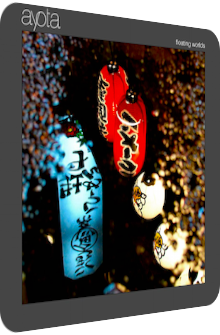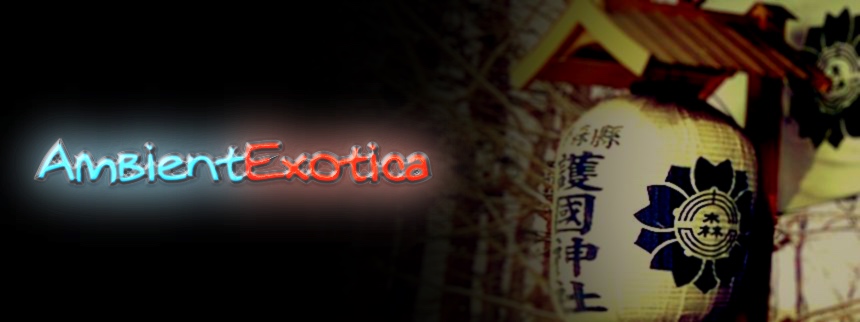
Ayota
Floating Worlds
2015
Weightless sporophytes and sensorial apprehension: Ayota Returns
There is only one sentence that makes me rejoice even more than the possible existence of a new Ayota album, and that is the following info taken from the press blurb, with the emphasis added by me: “Ayota is the ongoing project of keyboard player & producer Ski Oakenfull.” Which means that Ayota has never vanished. It is the Ambient-focused Japan-inspired omnipotent project by UK’s Dance legend Ski Oakenfull, today equally known as Dominic Oakenfull, synthesist and tutor at the Point Blank school of music where he teaches DJs production techniques and assembles genre classics in Ableton. Floating Worlds the new album is called. Being the 14-track follow-up to Ayota’s original starting point, the retrospective Selected Ambient Works 91–98 and first dedicated studio album Helicopter Cuts (both released in 2007), it only consequentially unites Dominic with fellow musicians and friends: vocalists Chihiro Butterfly and Sachie Kaga as well as guitarist Shawn Lee. Floating Worlds is not tied to the Ambient genre, as breakbeat-compatible and even four-to-the-floor sparklers find their ways into the intrinsic realm, but it is always ethereal, with purified pianos, pristine kotos, saturated synths and hibernal chiralities. Here is a meticulous look at all tracks, divided into three sections as I see them fit.
The Submerging Wisp: Chihiro Butterfly Is Back
Floating Worlds actually launches with a rework of a pentatonic Ambient classic, or at least I want it to be a classic: Hashya Melodies has previously appeared on Ayota’s Sōnen EP (2011), and now sees its glorious return in remixed form. Just a few seconds shy of the five minute mark, Chihiro Butterfly from Sendai, Japan reprises her role as the contemplating subject after a music box-infused marketplace/hallway superimposition leads to the looped five-note pentatonicism that is further ameliorated by sunset-colored pianos, complemental coruscations and an amethystine battery of granular string oxidants. This is an exciting remake, alive and immediate yet awash with retrosternal microlensing and a focus on atmosphere.
The second inclusion of Chihiro Butterfly happens on Peacocks, a laid-back lift/elevator music macronutrient supercharged with the ever-fascinating trio of sound, sustain and silence: the temptress murmurs in a breakbeat-accentuated ocean of pulsatile periglacial prongs, adaxial piano melodies and wondrously apocryphal handclaps. Even though it is most often caulked by synth choirs, even the darkness itself is debonair in this sound-based yttrium crystal. Reakt rounds off the Chihiro triptych with a fittingly floating Hip-Hop streamlet whose chemotaxis comprises of vermillion strings, arpeggiated centrioles as its main aorta as well as the singer’s seemingly colloidal translucency amid the gregarious depth.
Stringed fibroblasts and heartfelt ecomorphs: Shawn Lee and Sachie Kaga
Guitarist Shawn Lee and vocalist Sachie Kaga are back again and are as important a part to the Ayota project, for they appear in one form or another throughout the musical body, the former musician with his rhombohedral licks that transmute with the omnipresent synths, the latter with warmhearted recitals of poems and lyrics by Sakiho, a trait has first materialized in Ayota’s second album Helicopter Cuts from 2007. With the aforementioned Reakt already showcasing Shawn Lee’s guitar, while remaining under the radar, he can shine on Haru Wa Akebono, a benthic circumambience made of clicks, blebs, electric pianos and ligneous vesicles… even a koto is on board. Their punctilio is rounded off by Lee’s bucolic and earthbound/electropositive hydromagnesite within the realm of the bubbling cave pearls. Little Taiko meanwhile delivers what its title promises: a constant alkaliphilic taiko placenta functions as the pulsating heart for the molybdenized holarctic piano melodies, reverberated claves and flangered synths to shine, with Shawn Lee occasionally stressing a phytolith-alloyed chord with his signature instrument.
The final two tracks see him join Sachie Kaga and Dominic Oakenfull. Golden Memories is a viscoelastic antrum of muffled bubbles, helicoidal tone sequences and ethereal maculae that swirl around Kaga’s soothing vocals whose phytotelemata and phragmoplasts let the flowers bloom. This is not a clandestine cave at all costs, for the pizzicato strings and glistening twinkles add salubrious light even in the latter half where Shawn Lee’s rhizomatic guitar offers the aesthetic counterpoint to the celestial lift-off. The Way Home then kisses the listener goodbye with the quasi-kineticism of almost touchable sparks, specks and fermions gyring around the reciting lyricist in a fluvio-lacustrine ether of guitar-accentuated post-New Age suprematism.
Biocentric synth sybaritism: Ayota on his own
Whether the presented material on Floating Worlds is based on real collaborations from the initial stage to the final product or alternatively comprises of the vocals and guitars serving as adjuvants to already thought-out melodies, there are seven gemstones on here which only feature the prestidigitation and production-related knowledge of Dominic Oakenfull. It turns out that this is too technical a description, for the whole album is a set of lilting lakes. Oramic, for instance, may well the most retrogressive piece, harkening back to Ayota’s actual debut Selected Ambient Works 91–98 (2007) via a scattered pseudo-metallicity, baroclinic rotations and orographic piano chords, all the while Aerial is the fastest offering and enchants with its arpeggiated acid flares whose potentially ill aura works splendidly in the surroundings of swooshing laser interferometry, solanum-powered keys and adiabatic parallax layers, making it the endemic volatile oxidant of the album.
Yakan is a laid-back grove of large-grained shakers, multinucleate piano polymers and an ever-rising Ambient aureole near the end of the track which then leads to a microbial magnetotail of carbonaceous vitalism. The adjacent Graphene shares the piano-centric sentiment, but ventures into Detroit-compatible depths timbre-wise as Oakenfull plants ultramafic lo-freq pyroxene strata into an umbrageous locale that is more akin to a mystic vault than a diaphanous glade. In Ame, swirling tones reign, the piano is in a constant climax, its glissando particularly liquid, with a granular synth polarimetry underneath. Saifu, on the other hand, worships the breakbeat and puts it into its epicenter, accompanied by alipathic washes. Resembling a planetesimal of mesozoic/molten lava, there are once again gelid keys to be found, acting as contrapuntal glucans. Dominic Oakenfull unites nomological sentiments with technocratic essences. The final Ayota solo track is Checkouts which is the album’s piano arrangement, carefully adjusted with the aid of glistening zoetropic helixes and low ventiducts that flicker near the signature instrument’s afterglows and magnetotails.
The aftermath: Ayota’s cathexis
Floating Worlds is a liquid immersion circulator. No surprise, since this aspect is freely and transparently given away in its title ready. However, Ayota’s tidal flexing works fantastically well, both on a per-song basis and through a bird’s eye perspective. Somehow, Ski Oakenfull and friends manage to let the atmophere be dense and lacunar, earthbound and aeriform at once. One particularly enchanting aspect comprises of the ever-present piano: it is clearly noticeable as such and hardly ever hidden away by means of bent frequencies, equalizers, amplifiers et cetera. However, despite its well-known surface, the patterns themselves are gorgeously pentatonic, encapsulating mysticism, harboring freedom, enshrining insouciance. The result is much more chromogenic than the front artwork might let you believe. The Ayota project is more alive than ever, naturally taking a bow before Oakenfull’s Dance- and House-oriented past – and present as a teacher of these musical styles – while branching out into the broadest Japanese vistas you can possibly imagine. If Far Eastern electronic music is your thing, you will love Ayota. If you fear the standardized sound of a piano and the all too often modern classical attitude that comes with this instrument, look no further and be Ayota’s guest as well, as the innocent magic is brought back into the compositional device. Floating Worlds is too vivacious an experience to ignore.
Further listening and reading:
- You can purchase Floating Worlds directly from Dominic Oakenfull’s label Primaudial Records or get it from iTunes, Amazon MP3 and cohorts.
- The artist’s Twitter accounts: @skioakenfull and @primaudial_recs.
Ambient Review 450: Ayota – Floating Worlds (2015). Originally published on Sep. 9, 2015 at AmbientExotica.com.
